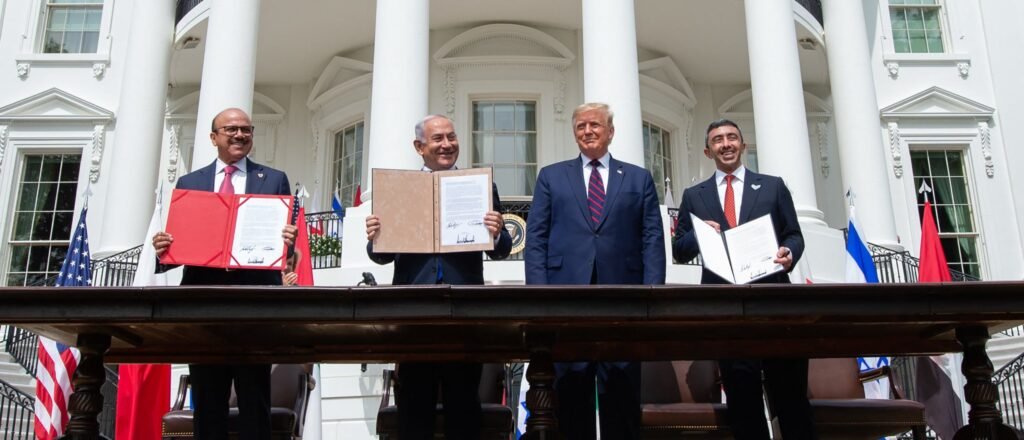Trump’s Efforts to Expand Abraham Accord
President Donald Trump is working to broaden the Abraham Accord in hopes of encouraging more Arab nations to normalize relations with Israel, which could significantly affect the future stability of the Middle East.
The Abraham Accord was a notable achievement during Trump’s initial term, successfully normalizing relations between Israel and countries like the United Arab Emirates, Sudan, Morocco, and Bahrain. Gaining additional signatories is proving challenging, yet experts believe that integrating more Arab nations could create a protective barrier against Iran and potentially set the stage for years of relative stability.
“The dynamics in the Middle East have shifted,” stated Shoshana Bryen, the senior director of the Jewish Policy Centre. “Israel is now seen as a stronger ally compared to Iran. The influence of Iran’s proxies has diminished, and countries like Jordan and Iraq, which once observed from a distance, are now aligning with Israel.”
U.S. Special Envoy Steve Witkoff has revealed that the Trump administration is looking to expand the accord. In a recent interview, he hinted at an upcoming major announcement regarding additional countries joining the Abraham Accord.
Experts suggest that if Saudi Arabia decides to join, it could create momentum for other Arab nations to follow suit. However, peace in Gaza under terms acceptable to Saudi Arabia is essential. Without resolving ongoing conflicts, the agreement might lack the necessary strength.
“If Saudi Arabia agrees, it would likely encourage other nations to come on board,” Witkoff noted. “But the complexities within Saudi Arabia mean we might not see any clear outlook this year. They need to address their internal situations for progress on peace to occur.”
Meanwhile, Israel has accepted a U.S. proposal for a 60-day ceasefire in Gaza, but Hamas has yet to agree to the terms. Israeli Prime Minister Benjamin Netanyahu has emphasized that Hamas must be dealt with adequately even after the ceasefire is accepted.
The U.S. also appears interested in normalizing relations with Syria and has lifted sanctions to promote stability. Recently, the Trump administration has eased tensions with Syria following the rise of a new government after the overthrow of former President Bashar al-Assad.
Trump is now considering Syria as a crucial partner for expanding the Accord. Yet, uncertainties regarding the new government make full normalization seem distant. There are advantages for Syria in establishing ties, such as economic opportunities and enhanced border stability.
One major challenge is the Golan Heights, a territory that Israel claims. Reports suggest that Syria is not explicitly demanding the return of this area, which could be a step toward a peaceful resolution.
“It seems Syrians may not insist on Golan Heights, which is a promising development,” Bryen commented. “They seem willing to let Israel maintain control over areas taken after the war.”
Lebanon is also being viewed as a potential player for a new agreement, despite its ongoing issues with Hezbollah. Recent Israeli military actions have diminished the influence of extremist groups, possibly leading to improved relations in the future.
Overall, revitalizing the Abraham Accord could play a vital role in the U.S.’s broader strategy in Asia if it helps foster long-term stability in the Middle East.
“Think of it like a parent helping their children grow up and become independent,” Noronha remarked. “It doesn’t signal a withdrawal but rather positions them to manage on their own.”
















